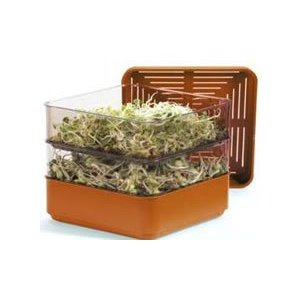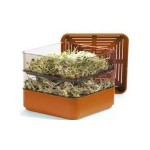Simple Health Tip: Start Sprouting!

Sprouted beans and seeds taste good and they’re very good for your health. What is more, sprouting is cheap.
So here’s our dummies guide to sprouting:
Firstly, since beans are the seeds of bean plants, we’ll just use the word seeds in this article and we’ll detail later which beans and seeds can be sprouted.
Why Eat Sprouted Seeds?
Seeds contain all that a plant needs to start growing: its genetic code and enough nutrients to see it through the first few days until the plant can produce its own nourishment. Seeds contain protein, starch, fat, vitamins, minerals. The quantities and compositions vary per type of seed.
When you add water to seeds, germination starts and with it a fantastic transformation process:
- water, minerals and vitamins content is greatly increased
- proteins are broken down into amino acids, carbohydrates into simple sugars (making it easier for us to digest them)
- toxins that were present in beans (tannins, trypsin) making them harder to be digested decrease and sometimes disappear after 60 hours of germination
After just a few days of sprouting, you get something with a high nutritional content and easily digestible. It’s no wonder sprouting is so popular amongst vegetarians. But everybody can and should benefit from sprouted seeds.
Which Seeds Can You Sprout?
You’ve got a large choice.
There are the ones which give small green plants (alfafa, cress, radish, broccoli,…) and are best grown in open trays. And there are the beans, grains and nuts (adzuki, mung, lentil, soybeans, chickpeas, barley, wheat, sesame, almond, sunflower, …).
It’s best to buy your seeds from a specialist store or from your supermarket if they store them. Buy them organic if you can.
Once sprouted, green plants and small beans do not require cooking. They make great additions to salads and sandwiches. Use a olive oil and balsamic vinegar vinaigrette and they’ll taste just great.
It is better to slightly cook or steam grains and larger beans to make them easier to digest or you can simply add them to soups.
What Do You Need To Start Sprouting & How Do You Do It?
Now you’ve chosen your seeds, you will need something to grow them in.
There are several solutions: trays, jars, bags.
Whatever your choice, you’ll need to soak the seeds overnight first. After you’ve rinsed them, you can put them in your chosen container. Make sure you keep them moist by watering them regularly (twice a day, more if it’s hot). Do not drown them – drain the excess water (through the lid if your seeds are in a jar, through to the next tray down if you use a tray) in order to avoid rot.
Sprouts need air to breathe. Keep them at room temperature. Do not put them in direct sunlight. Generally after 2-5 days (time vary according to the type of seeds), you’ll be able to eat your very own sprouts. Do rinse them before you eat them. Don’t let the seedlings grow for too long otherwise they will become less tasty.
When they’re ready, it is best to harvest them, rinse them and keep them in a container in your fridge.
Eat them quickly (to avoid vitamin loss).
Personally, I have a stackable 3 layers sprouting tray with a lid and a bottom tray that collects water. I’ve been very happy with it. I love the fact that I can sprout different seeds at the same time without taking any more space.
<– Here’s an affordable one from Amazon to give you an idea of what it looks like.
Watering is very practical if you have a bag. You just run water over it and the excess naturally falls.
As for the jar, the best thing about it is that you can easily build your own version from recycling material: take a glass jar, put your seeds in and cover with a nylon stocking secured with an elastic band. Pour water over the cloth and get rid of excess water by tipping the jar.
Here’s what a jar you buy would look like. –>
Some Final Tips
- Do not use too many seeds at once. They need space to grow and they will increase massively in size.
- Do not start all your trays at the same time or you’ll end up with far more sprouts than you can possible eat.
- Be careful, if some seeds don’t sprout and are still hard, make sure you take them out so you don’t hurt your teeth while eating the others.
- Don’t eat sprouts constantly. Have them in moderate amounts as part of a balanced diet.


Good one
Thanks Rajeev,
take care & best wishes,
Alan
I think my parents would enjoy growing stuff from seed sprouts.
Good for them – you should give it a try too!
😉
take care,
Alan